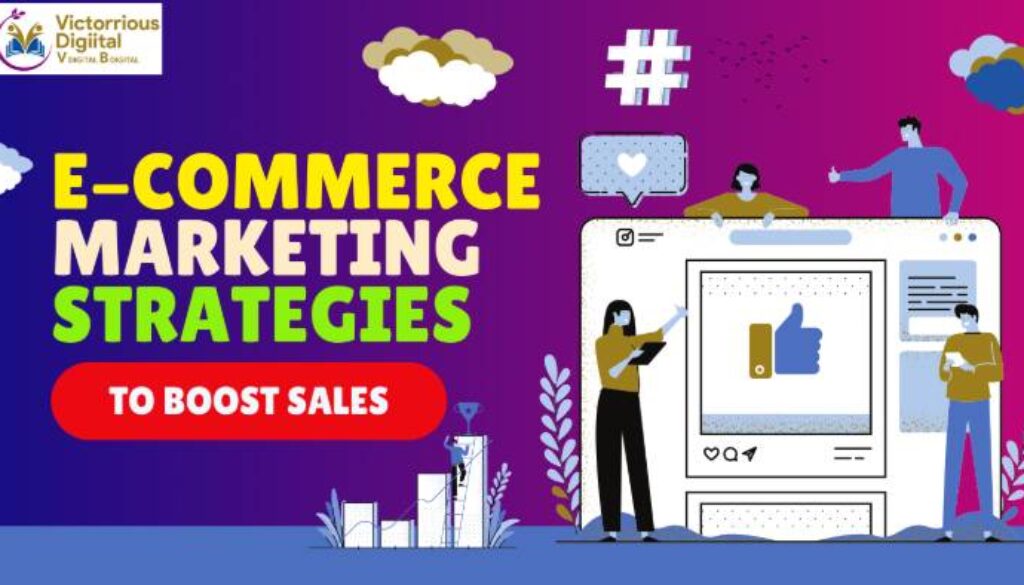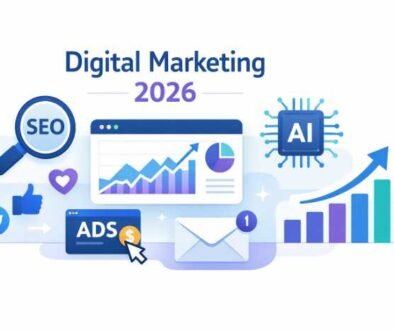E-commerce Marketing Strategies to Boost Sales
In today’s world, online shopping has become the go-to option for many people. Whether it’s clothes, electronics, groceries, or even services, consumers are buying everything online. If you are a business owner with an e-commerce store or planning to start one, the key to success lies in your marketing strategies. In this blog, we will explore various e-commerce marketing strategies that can help boost your sales and reach more customers.
If you are interested in learning how to apply these strategies or dive deeper into the world of digital marketing, you can enrol in Digital Marketing courses in Pune. These courses will teach you everything you need to know to run a successful e-commerce business.
Let’s explore the top strategies that can help you boost your sales and grow your online store.
Table of Contents
What is E-commerce Marketing?
Before jumping into strategies, let’s first understand what e-commerce marketing is. E-commerce marketing is the process of using various online marketing techniques to drive traffic to an online store and encourage visitors to make a purchase. These marketing techniques can range from search engine optimization (SEO) to social media advertising and email marketing.
In simple terms, e-commerce marketing is all about promoting and selling your products online in a way that attracts potential customers and keeps them coming back for more.
1. Understand Your Target Audience
Before you start promoting your products, it’s important to understand who you are selling to. Knowing your target audience helps you create tailored marketing campaigns that resonate with the people who are most likely to buy from you.
For example: Suppose you run a training institute that offers digital marketing courses. Your target audience could include people who want to learn about digital marketing, business owners who want to grow their online presence, or even students looking to build a career in digital marketing. Identifying these specific groups will help you tailor your marketing efforts to attract the right customers.
2. Search Engine Optimization (SEO)
When it comes to e-commerce marketing, SEO is one of the most important strategies to consider. SEO involves optimizing your website so that it ranks higher on search engines like Google. The higher your website ranks, the more likely customers will find it when they search for products like yours.
To improve your e-commerce store’s SEO, you should:
- Use the right keywords in your product descriptions, blog posts, and other website content.
- Make sure your website is easy to navigate.
- Optimize your images so that they load faster.
- Use SEO tools to track your performance and make improvements.
For example: If you are running a training institute that offers digital marketing courses in Pune, including keywords like “digital marketing courses in Pune with placement” on your website will help your store rank higher for people searching for such courses in your area.
3. Paid Advertising (PPC)
Paid advertising is another powerful strategy for e-commerce businesses. One of the most common forms of paid advertising is Pay-Per-Click (PPC) advertising. This involves placing ads on search engines, social media platforms, and other websites, where you pay every time someone clicks on your ad.
Platforms like Google Ads and Facebook Ads are great places to run PPC campaigns. You can target your ads based on factors like location, interests, and demographics to ensure that they reach the right people.
For example: If you want to advertise your digital marketing training institute in Pune, you can run ads targeting people who are interested in learning digital marketing or looking for courses in Pune.
4. Social Media Marketing
Social media is one of the most effective ways to reach and engage with your audience. Platforms like Facebook, Instagram, Twitter, and LinkedIn offer businesses an opportunity to showcase their products, interact with customers, and drive traffic to their e-commerce stores.
To get the most out of social media marketing, follow these steps:
- Create engaging content that appeals to your audience.
- Use hashtags to increase the reach of your posts.
- Run social media ads to target a specific audience.
- Post regularly to keep your followers engaged.
For example: A digital marketing institute in Pune can create Instagram posts with tips on digital marketing or share success stories of students who have completed their courses.
5. Email Marketing
Email marketing is one of the oldest and most effective marketing strategies. By building an email list, you can directly communicate with your customers and encourage them to make a purchase.
Here’s how to use email marketing effectively:
- Send personalized offers and discounts to your subscribers.
- Use email newsletters to keep customers updated about new products or services.
- Create abandoned cart emails to remind customers about items they left behind in their shopping carts.
Example: A digital marketing training institute in PCMC can send emails to students who have shown interest in the course but haven’t enrolled yet. The email could include details about the course, testimonials from previous students, and an exclusive discount to encourage them to sign up.
6. Influencer Marketing
Influencer marketing involves partnering with influencers or bloggers who have a large following to promote your products. Influencers can help you reach a wider audience and build trust with potential customers.
Here’s how to use influencer marketing:
- Find influencers who are relevant to your industry.
- Partner with influencers to promote your products in an authentic way.
- Offer influencers free products or a commission for sales generated through their promotion.
For example: A Digital Marketing training institute can partner with popular bloggers or YouTubers who review online courses and have a significant following in the digital marketing community.
7. Retargeting Ads
Sometimes, potential customers visit your website, add items to their cart, but leave without making a purchase. Retargeting ads allow you to reach these customers again by showing them ads for the products they viewed but didn’t buy.
Retargeting ads can be done through platforms like Google Ads or Facebook. By showing these customers ads that remind them of your products, you increase the chances that they will come back and complete their purchase.
For example: If someone visited your Digital Marketing courses in Mumbai with a placement page but didn’t enroll, you can show them a retargeting ad on Facebook or Google with more information about the course and a special offer.
8. Offer Discounts and Promotions
Everyone loves a good deal! Offering discounts and promotions is a great way to encourage people to make a purchase. This can be especially effective during holidays or special events.
You can offer:
- Percentage discounts (e.g., 20% off).
- Free shipping on orders over a certain amount.
- Buy one, get one free offer.
For example: A digital marketing training institute in Pune can offer discounts to students who enroll during a specific time frame, such as a “New Year Special” discount.
9. Optimize Your Website for Mobile Devices
More and more people are shopping from their mobile phones. If your website isn’t optimized for mobile devices, you could be losing out on potential customers. Make sure your website is responsive and easy to navigate on smartphones and tablets.
Here are a few tips:
- Use mobile-friendly design.
- Ensure fast loading times.
- Simplify the checkout process to make it easy for mobile users.
Example: A digital marketing course in Pune website should be mobile-friendly so that prospective students can easily browse through the course details and sign up from their mobile phones.
10. Customer Reviews and Testimonials
Customer reviews and testimonials play a huge role in influencing buying decisions. When potential customers see that other people have had a positive experience with your products or services, they are more likely to trust your brand.
Encourage your customers to leave reviews on your website or third-party review sites like Google Reviews, Trustpilot, or Yelp.
Example: After a student completes a digital marketing course in Pune, encourage them to leave a testimonial about their experience. Positive reviews will help build trust and attract new students.
Also Read – How to Build an Effective ORM Strategy?
Conclusion
E-commerce marketing is all about understanding your audience and applying the right strategies to drive sales. From SEO and social media marketing to email marketing and influencer collaborations, there are many ways to promote your ecommerce store. By using these strategies effectively, you can boost your sales, build a loyal customer base, and grow your business.
If you want to learn more about these strategies and how to apply them, consider joining Digital Marketing courses in Pune. These courses will teach you how to implement digital marketing techniques and help you stay ahead in the competitive world of e-commerce.
For those looking to dive deeper into digital marketing, enrolling in a Digital Marketing training institute in Pune is a great choice. With digital marketing courses in Pune with placement options, you can gain the skills needed to excel in the digital marketing world and help businesses like yours succeed.
So, start implementing these strategies today and watch your sales soar!




